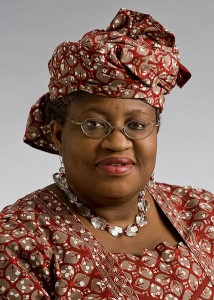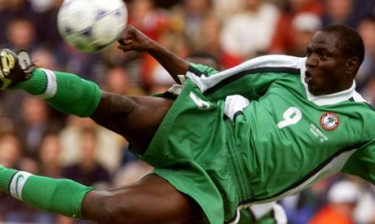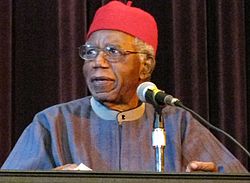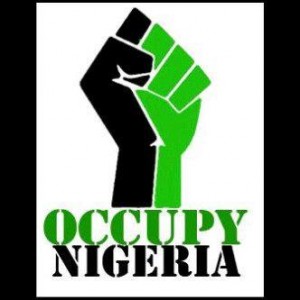
Posts by NwachukwuEgbunike:
Nigeria’s Chinua Achebe Remembered as ‘Trailblazer’ for African Literature
April 1st, 2013
By Nwachukwu Egbunike.
Nigerian author Albert Chínụ̀álụmọ̀gụ̀ Àchèbé, better known as Chinua Achebe whose internationally praised writing gave Africans a voice by destroying the mold cast by colonialism, died on March 22, 2013. He was 82.
Achebe’s seminal novel, “Things Fall Apart“, was one of the first African novels written in English to achieve worldwide success. The novel, which was published in 1958, has been translated into more than 50 languages.
In a testament to the profound impact of his body of work, Achebe’s death has been mourned around the world.
Chinua Achebe (1930-2013). Image released under Creative Commons (CC BY-SA 3.0) by Stuart C. Shapiro
Two literary contemporaries of Achebe – Wole Soyinka and J. P. Clark – mourned the loss of their “brother” on African entertainment website Bella Naija:
For us, the loss of Chinua Achebe is, above all else, intensely personal. We have lost a brother, a colleague, a trailblazer and a doughty fighter. Of the ‘pioneer quartet’ of contemporary Nigerian literature, two voices have been silenced – one, of the poet Christopher Okigbo, and now, the novelist Chinua Achebe.
It is perhaps difficult for outsiders of that intimate circle to appreciate this sense of depletion, but we take consolation in the young generation of writers to whom the baton has been passed, those who have already creatively ensured that there is no break in the continuum of the literary vocation. We need to stress this at a critical time of Nigerian history, where the forces of darkness appear to overshadow the illumination of existence that literature represents.
For New York Times book critic Dwight Garner, Achebe deserves to be called the father of modern African literature:
Mr. Achebe was a mentor and role model to a generation of African writers — he’s often referred to as the father of modern African writing. But like many novelists who find success with an early book, Mr. Achebe found himself almost solely defined by “Things Fall Apart.”
It’s been more than 50 years since the publication of Mr. Achebe’s pioneering and canonical novel; it no longer seems to stand, to a Western audience at any rate, for African writing as a whole. His talent and success have helped spawn an array of postcolonial writing from across the continent. Among the talented young Nigerian writers alone who cite him as an influence are Chimamanda Ngozi Adichie, Adaobi Tricia Nwaubani and Lola Shoneyin.
Author Chimamanda Ngozi Adichie wrote a moving eulogy for Achebe in the Igbo language on Farafina Books blog:
Ife mee. Nnukwu ife mee. Chinua Achebe anabago. Onye edemede nke di egwu, onye nnukwu uche, onye obi oma. Keduzi onye anyi ga-eji eme onu? Keduzi onye anyi ga-eji jee mba? Keduzi onye ga-akwado anyi? Ebenebe egbu o! Anya mmili julu m anya. Chinua Achebe, naba no ndokwa. O ga-adili gi mma. Naba na ndokwa.
A tree has fallen. A mighty tree has fallen! Chinua Achebe is gone. The inimitable wordsmith, the sage, the kind man. Now who is there for us to boast about? Who will be our rampart? How are the mighty fallen! My eyes are in flood with tears. Chinua Achebe may your soul rest in peace. It is well with you. Rest in peace. [Translation done by Mazi Nnamdi Nwigwe]
Nigerian authors have lost a friend and mentor, Remi Raji, president of the Association of Nigerian Authors, lamented on the organization’s website:
Eagle on Iroko, the master-artist, the compelling stylist of the English language has left the world of the flesh, he left in the middle of a revived discourse of the fate of our Nigerian nation. And it was a symbolic day. In the commemoration of the UNESCO World Poetry Day, things fell apart in the firmament of Nigerian and African Literature. A bleak day indeed, the devastating reality, the ending of a huge chapter in the history of African Literature. Adieu Chinua Achebe, adieu irreplaceable son of Africa.
Poet and essayist Niyi Osundare celebrated this worthy son of Africa on news website Citizens Platform:
But if the sheer force and range of Achebe’s fiction gave Africa a voice, the fearless truth of his critical interventions challenged so many myths and deliberate falsehoods about the most misrepresented and recklessly abused continent in the world.
Achebe knew, and he tried to get us to know, that Africans will remain mere objects of the stories told by others, until they, Africans, have started to tell their own story their own way – without shutting out the rest of the world. Achebe challenged the 20th century philosophy of fiction as a pretty object d’art, arriving with works which foregrounded the human condition and told the wondering world that the clotheless Emperor was, indeed, naked! He entered a plea for the urgent necessity of an entity called ‘applied art’ and emboldened us to look triumphalist Formalism in the face and demand to see its passport. Yes, Achebe told a world sold to the art-for-art’s-sake mystique that it is, indeed, possible to be an accomplished novelist who is also a teacher.
Richard Dowen wrote on the website African Arguments that Achebe bore a lot of similarities to Nelson Mandela:
A conversation with Chinua Achebe was a deep, slow and gracious matter. He was exceedingly courteous and always listened and reflected before answering. In his later years he talked even more slowly and softly, savouring the paradoxes of life and history. He spoke in long, clear, simple sentences which often ended in a profound and sad paradox. Then those extraordinary eyes twinkled, his usually very solemn face would break into a huge smile and he would chuckle.
He had a look of Nelson Mandela about him. Both have that ability to look very stern and solemn and then break into a huge smile. It happened when they met each other in South Africa, his daughter, Nwando, told me. At first the two men just looked at each other and then burst out laughing as if recognizing their brotherhood. Both romantic about Africa’s traditions, they talked and talked. Mandela had read Things Fall Apart when he was in prison on Robben Island and he said of Achebe: “The writer in whose company the prison walls fell down.”
The University of Nigeria has declared a period of mourning for Achebe, who worked as a professor there. Achebe, according to the university’s vice-chancellor, gave a voice not only to Africa but also to human civilization:
Prof Achebe was one of the academic titans whose presence on the faculty served as a beacon of light that drew the world to the University of Nigeria. He taught in the Department of English as well as carried out research at the Institute of African Studies.
After the epochal Things Fall Apart that gave a voice to African literature and its people, Achebe continued his pioneering endeavours with the founding of Okike, a foremost journal of African literature that birthed the careers of many a distinguished writer. His work in leading research into the cultures of the Igbo and various groups in the Institute of African Studies further cemented the reputation of the University of Nigeria as a centre of liberal learning in the best traditions. Achebe in his work gave to the language, culture and people of Igbo land, a universality that positioned it as one of the major ethnic groups of human civilisation.
Ije oma, Albert Chínụ̀álụmọ̀gụ̀ ÀchèbéBulu anya anyi n’ala mmuoKa anyi bulu anya gi n’ala ndi di nduOkeosisi adaUmu nnunu eju ofiaKachifo Ogbuefi Achebe
Safe journey, Albert Chinualumogu AchebeBe our eyes in the land of the deadWhile we be your eyes in the land of the livingA great Iroko has fallenThe birds are scattered in the forestGood night, Ogbuefi Achebe
Nigeria 2012 Great Challenges And Even Greater Victories
January 28th, 2013By Nwachukwu Egbunike.
“Africa’s most populous country and it’s brightest hope. Nigeria is an odd place to find a silver lining. In spite of its all-too-visible failings, I believe that Nigeria’s mix of talent, resources, and gall will one day pull the country up out of Africa’s Nth World.”
– Blaine Harden, “Africa: Dispatches from a Fragile Continent”.
2012 was a curious mix of tensions, anguish and hope for Nigeria. The blogosphere never had an idle moment. We present our picture of Nigeria, from an amalgamation of some of the stories that made news on Global Voices in 2012. These narrations represent a country, where challenges arise continuously but also unceasingly emits hope.
Citizen media and activism
Early in January 2012, Nigeria got the world’s attention with a presidential announcement that withdrew the subsidy on fuel. Trade unions and civil society organizations responded with #OccupyNigeria protests. For days, the nation was shut down: no one worked, earned or learned. Of particular interest was the galvanisation of cyberspace with face-to-face protests. This synergy between online and real time protest was articulated by African Urbanism:
Occupy Nigeria Logo (Courtsey: Nigerianstalk.com)
As a lover of communications, media and especially social media, there are two things about this movement that make me especially excited: 1) First, the impressive role that social media is playing in terms of documenting and for coordinating activities and 2) the astounding amount of people that are making use of this medium to make their voiced heard… “Follow#occupynigeria #fuelsubsidyfor just a couple minutes and you’ll see precisely what I’m talking about — in a highly mobile country of more than 150 million, tweets are coming in so fast at times it’s almost impossible to keep up with the conversation.
In July, we reported the reaction of netizens to the call of the Nigerian Senate President – a move he later denied – to clamp down on social media. This news ignited the blogosphere and was perceived as a declaration of war by netizens:
Digital natives also amplified the voices of offline victims who were displaced from their slum homes in Makoko, Lagos.
@chineduozordi: After her shanty in Makoko was demolished by the government, Janet and her 3 kids simply moved into their canoe ensconced under the 3MB (Third Mainland Bridge).
Twitter users were disgusted not because a slum was demolished but how the way it was done. Apparently, the victims were not given enough time to find alternatives.
@tejucole: The living conditions in Makoko were appalling, but appalling, too, is waking up to guns, bulldozers, violence, and sudden homelessness.
We introduced you to Battabox – a Nigerian Conversation – which engages real life stories from the street, weaves a narration and presents it to a global audience through online videos. Here is an interview with Christian Purefoy of Battabox with our author, Nwachukwu Egbunike.
The mob justice meted on the “Aluu4″ was a rather horrid and horrifying low point for Nigerians.Julie Owono discusses the incident and its aftermath in this post – “A Legal Solution to Mob Justice in Nigeria”.
Nigerian Bloggers and Tweeps Saved #Oke was one of the greatest manifestations of hope that emanated from the Nigerian blogosphere in 2012. Oke, a young Nigerian almost lost his foot to diabetes if not for a campaign that was facilitated by netizens. He was flown to India where he got medical attention. This story is a part of the Global Voices eBook: African Voices of Hope and Change.
In Lessons from the #SaveOke Campaign Fairy GodSister’s highlights four components:
Social Media is Powerful
I’ve never doubted the power of social media (wouldn’t have studied it if I did) but if I did, this campaign would have forever put paid to those doubts. The speed with which the blog posts spread and the amazing functionality called the ‘retweet’.
Nigeria is in Trouble
Oke’s story was just another instance pointing to a problem we (Nigeria) haven’t gotten past. Unfortunately, even in 2012 we are still in the ‘reaction’ rather than ‘proactive’ mode. No one thinks to plan for the future, hell we’re barely getting through today!
Who Sings for the Unsung?
How many people die every day because they have no access to qualitative healthcare? How many ‘trivial’ cases transform into life threatening because they were not nipped in the bud with adequate treatment? Who sings for the unsung?
We are still the World
Social media has always and will always revolve around people. Social media without human involvement can be compared to a beautiful car without a driver: it is nothing without our input. It is one thing to sit in the comfort of your home and moan every day about everything going wrong with the country, how the government doesn’t care, how we need a ‘paradigm shift (lol), etc. It is a totally different (and more profitable) thing however to do your civic duties, know your leaders (local and national), and then hold them accountable by getting informed, asking them questions, you know the drill.
Politics, Diplomacy and Arts

Ngozi Okonjo-Iweala, Nigeria’s Finance and Co-ordinating Minister of the Economy. Image released in the public domain by www.imf.org/
Ngozi Okonjo Iwealla’s (NOI) bid for the World Bank Presidency generated global ripples online and offline. She was also grateful for the support from other African countries. NOI’s Facebook post stated as follows:
I am honoured by my nomination and the support of multiple African Nations to make the World Bank more representative of the people it serves. As an employee of the Bank for 22 years, I know of its commitment to improving the lives of those in developing world. It is that passion that inspires me to do the most I can for Nigeria as the Minister of Finance.
Although the Nigeria’s Finance Minister lost the bid to the US favourite, she was seen as the best candidate. And this was obvious with netizens continued talking even after the selection. On her Facebook page, Ngozi congratulated the new World Bank president and adds:
With regard to the selection process, it is clear to me that we need to make it more open, transparent and merit-based. We need to make sure that we do not contribute to a democratic deficit in global governance.
Nevertheless, by our participation we have won important victories. We have shown what is possible. Our credible and merit-based challenge to a long-standing and unfair tradition will ensure that the process of choosing a World Bank president will never be the same again. The struggle for greater equity and fairness has reached a critical point and the hands of the clock cannot be turned back.
Nigeria-China relations were a mix bag. In July, Oiwan Lam, reported protests that were triggered because of the suspicious death of a Nigerian in Guangzhou’s Sanyuanli District while in police custody. In September, the Lagos State Government introduced Mandarin in public schools.
Zuma Rock, in Abuja – capital city of Nigeria – was one of the contestants in the voting for One of the Seven Wonders of Africa. Similarly, two Nigerian writers – Chinua Achebe and Wole Soyinka – were among the list of contenders for the 10 Most Influential African Thinkers Alive.
The Osun Osogbo Sacred Groove – a UNESCO designated cultural site – made a comeback to the global scene through a documentary. The producer, Immanuel Afolabi spoke to Nwachukwu Egbunike – among other things – about digitalizing Africa’s spiritual experience.
Sports
Richard Wanjohi chronicled the buzz generated by the death of Rashidi Yekini (1963-2012) – one of Africa’s highest scoring heroes in football.

Rashidi Yekini – Nigeria’s soccer legend. Photo source goal.com.
The North Bank Evening Standard from Gambia also shared highlights of his career:
Yekini scored nearly 40 goals as a Nigerian international, and represented the nation in five major tournaments, including 2 World Cups, where he scored the country’s first-ever goal in the competition. He was also named the African Footballer of the Year once
The William Sisters, Serena and Venus, were in Nigeria between October 30 to November 2, 2012. In this post we presented the rousing welcome they received in Lagos.




